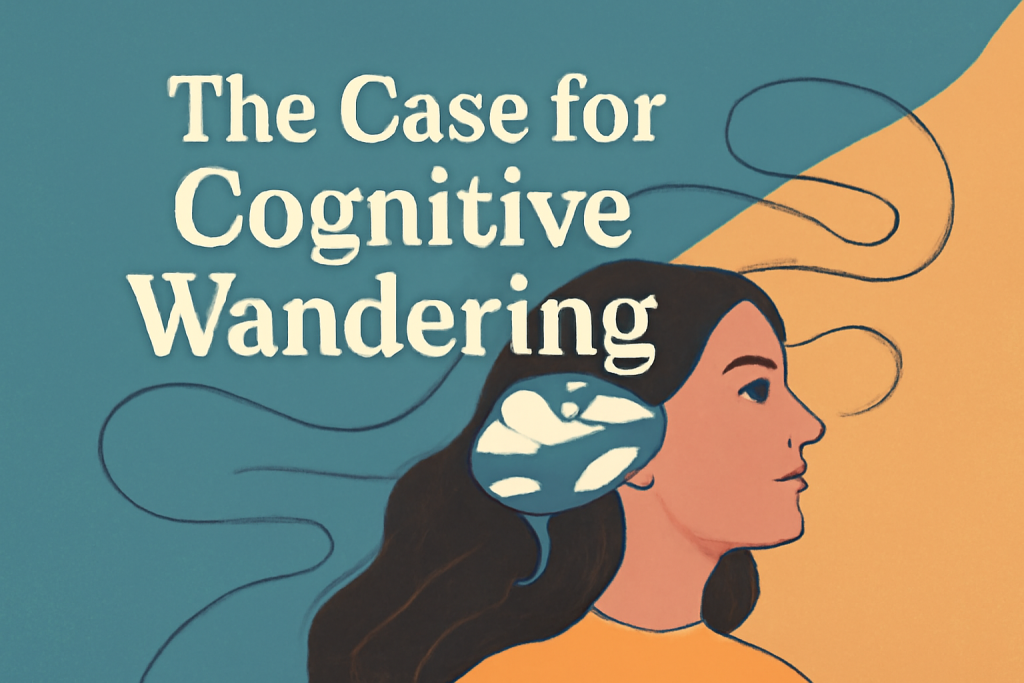In our highly structured, fast-paced world, it’s easy to view moments when our minds wander as unproductive, a sign of distraction or laziness. We’re constantly told to stay focused, remain present, and avoid getting distracted by “mindless” thoughts. But what if we’ve been wrong? What if the act of cognitive wandering — allowing your mind to drift away from the task at hand — has important psychological and creative benefits that we’ve been overlooking?
Emerging research is showing that cognitive wandering, far from being a mental detour, can actually be a powerful tool for personal growth, creativity, and well-being. In this article, we’ll explore the science behind cognitive wandering, its surprising benefits, and how you can harness its power to enhance your life.

1. What is Cognitive Wandering?
Cognitive wandering, also known as mind-wandering or daydreaming, is the process where our thoughts drift away from the task at hand and focus on unrelated ideas, memories, or scenarios. We all experience it at some point — whether it’s during a long meeting, a quiet walk, or even while trying to fall asleep.
At its core, cognitive wandering happens when the brain is free to explore thoughts outside the constraints of focused tasks. Far from being a distraction, these moments of mind-wandering are a natural function of the brain that allows us to process emotions, solve problems, and create new ideas.
2. The Science Behind Cognitive Wandering
For years, cognitive wandering was considered a sign of inefficiency or lack of discipline. Researchers believed that when our minds wandered, we were simply failing to concentrate. However, in recent studies, scientists have found that daydreaming can actually be linked to improved brain function and overall well-being.
A study published in Psychological Science revealed that people who allowed their minds to wander were often able to solve problems more creatively than those who focused solely on the task at hand. This process, known as “incubation,” happens when the brain works on a problem subconsciously while we are distracted. The wandering mind allows for the cross-pollination of ideas that may otherwise remain disconnected.
Another study, this time from Harvard University’s Default Mode Network research, identified that mind-wandering is connected to the brain’s default mode network (DMN), which is active when we’re not focused on external tasks. This network is involved in self-reflection, memory consolidation, and creativity — all of which are essential for personal growth and problem-solving.
3. The Benefits of Cognitive Wandering
Now that we understand what cognitive wandering is and how the brain uses it, let’s explore why it’s beneficial.
1. Boosting Creativity and Problem-Solving
Cognitive wandering can lead to breakthrough ideas and solutions. When our minds wander, they often make unexpected connections between different concepts or memories. This can help in creative thinking and problem-solving.
For example, many great thinkers, including Albert Einstein and Steve Jobs, were known to allow their minds to wander during walks or while engaging in simple tasks. This process allowed them to see problems from different angles and spark innovative ideas.
-
Practical Tip: The next time you’re stuck on a problem, step away and let your mind wander. Go for a walk, doodle, or simply sit and let your thoughts drift. You may be surprised by the creative insights that emerge.
2. Enhanced Emotional Processing
Another key benefit of cognitive wandering is its role in emotional regulation. When we let our minds wander, we often revisit unresolved emotions or experiences, allowing us to process them in a more detached way. This helps reduce stress and anxiety by allowing us to gain distance from emotional triggers.
Research has shown that mind-wandering can help us reframe our thoughts and put emotional events into perspective. In essence, cognitive wandering can act as a mental “reset,” providing us with a fresh outlook on challenging situations.
-
Practical Tip: Use cognitive wandering as a tool for emotional regulation. If you’re feeling overwhelmed, take a break, let your mind wander, and see what emotional clarity comes up.
3. Memory Consolidation
Cognitive wandering plays a crucial role in memory consolidation. When our minds wander, we are more likely to access past experiences and memories, which allows us to make connections and store information more effectively. This is particularly useful when studying or trying to learn new skills.
By revisiting old memories during mind-wandering episodes, the brain strengthens neural connections, making it easier to recall information later. In fact, studies have shown that periods of mind-wandering during learning can boost memory retention and comprehension.
-
Practical Tip: If you’re studying or learning something new, take short breaks to let your mind wander. You might find that you retain information better after allowing your brain time to consolidate knowledge.
4. Increased Self-Awareness and Personal Growth
Cognitive wandering is closely linked to self-reflection. When we daydream, our thoughts often turn inward, helping us analyze our goals, desires, and personal experiences. This process can lead to greater self-awareness and emotional growth, as we gain insight into our motivations, fears, and aspirations.
Additionally, the mental space created during mind-wandering gives us the opportunity to plan for the future. Whether we’re considering career changes, relationships, or personal goals, cognitive wandering offers a mental playground for strategic thinking and personal development.
-
Practical Tip: Use mind-wandering as a time to reflect on your goals and aspirations. Let your thoughts naturally wander to what you want to achieve, and allow the creative insights to guide your next steps.
4. How to Harness the Power of Cognitive Wandering
While cognitive wandering can be beneficial, it’s important to strike a balance. Too much mind-wandering can lead to procrastination or excessive rumination, especially if the wandering is centered around negative or unproductive thoughts. Here’s how to harness the power of cognitive wandering in a healthy way:
-
Create the Right Environment: For cognitive wandering to be beneficial, you need a conducive environment. Find moments when you can let your mind wander without distractions — whether that’s during a walk, a shower, or while commuting.
-
Practice Mindfulness: Mindfulness practices can help you channel mind-wandering toward productive and positive areas. Pay attention to the thoughts that arise and use them for reflection or creative insights.
-
Set Boundaries: While allowing your mind to wander is helpful, it’s important to also have focus when needed. Set times for deep focus work and times for relaxed thinking. This balance allows you to be both productive and creative.
Conclusion
The case for cognitive wandering is clear: far from being a mental detour, it’s a powerful tool for creativity, emotional regulation, memory consolidation, and personal growth. By embracing cognitive wandering, we give ourselves the opportunity to process emotions, solve problems, and reflect on our goals in a deeper and more meaningful way.
Next time your mind starts to wander, don’t feel guilty. Instead, embrace it. Recognize the power of a wandering mind, and use it to your advantage. Whether you’re looking to boost your creativity, improve your emotional well-being, or gain clarity on your goals, cognitive wandering can be an invaluable tool in your wellness journey.
Reference
1.Baird, A., Smallwood, J., & Schooler, J. W. (2011). “Back to the future: Autobiographical planning and the functionality of mind-wandering.” Psychological Science, 22(3), 396-403. Available at: https://journals.sagepub.com
2.Christoff, K., Irving, Z. C., Fox, K. C., Spreng, R. N., & Andrews-Hanna, J. R. (2016). “Mind-wandering as spontaneous thought: A dynamic framework.” Psychological Bulletin, 142(3), 370–398. Available at: https://pubmed.ncbi.nlm.nih.gov/
3. Mueller, P. A., & Oppenheimer, D. M. (2014). “The Pen Is Mightier Than the Keyboard: Advantages of Longhand Over Laptop Note Taking.” Psychological Science, 25(6), 1159-1168. Available at: https://journals.sagepub.com









